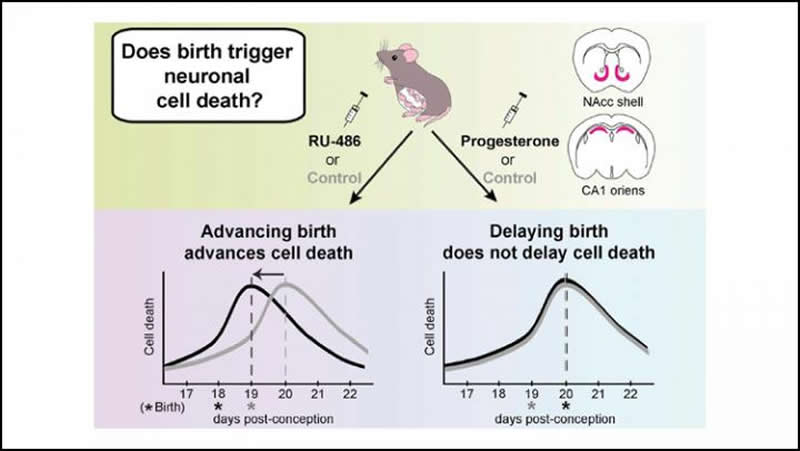Summary: Early birth prompted apoptosis to begin a day early, but delaying the birth did not alter when cell death began to occur. The study suggests birth time has an important and previously unrecognized effect on brain development.
Source: SfN
Moving birth a day early triggers an early start to widespread neuron death, according to new research in mice published in eNeuro.
Right before and after birth, about half of the neurons in the developing brain die. Scientists have known about this normal process for half a century, but no one knows what controls it. Is it an external signal like birth, or an innate developmental mechanism?
Castillo-Ruiz et al. induced labor a day early or pushed birth a day late in mice – still within the healthy time frame- and monitored how the change affected neuron death. By focusing on brain regions that experience extreme cell death soon after birth, the researchers could detect the effects of small changes in birth timing.

Early birth prompted cell death to start a day early but delaying birth did not alter when cell death occurred. This indicates that a developmental process takes over when birth is delayed. The results raise questions about the consequences for subsequent brain development when women opt to induce labor early.
Source:
SfN
Media Contacts:
Calli McMurray – SfN
Image Source:
The image is credited to Castillo-Ruiz et al., eNeuro 2020.
Original Research: Closed access
“Does Birth Trigger Cell Death in the Developing Brain?”. Alexandra Castillo-Ruiz, Taylor A. Hite, Dina W. Yakout, T. John Rosen and Nancy G. Forger.
eNeuro doi:10.1523/ENEURO.0517-19.2020.
Abstract
Does birth trigger cell death in the developing brain?
Developmental cell death eliminates half of the neurons initially generated in the mammalian brain, and occurs perinatally in many species. It is possible that the timing of neuronal cell death is developmentally programmed, and only coincidentally associated with birth. Alternatively, birth may play a role in shaping cell death. To test these competing hypotheses, we experimentally advanced or delayed birth by one day in mice (within the normal range of gestation for the species) and examined effects on the temporal pattern and magnitude (amount) of neuronal cell death, using immunohistochemical detection of activated caspase-3 as a cell death marker. In order to detect effects of subtle changes in birth timing, we focused on brain areas that exhibit sharp postnatal peaks in cell death. We find that advancing birth advances peak cell death, supporting the hypothesis that birth triggers cell death. However, a delay of birth does not delay cell death. Thus, birth can advance cell death, but if postponed, a developmental program governs. Advancing or delaying birth also caused region-specific changes in the overall magnitude of cell death. Our findings shed light on the long-standing question of what controls the timing and magnitude of developmental neuronal cell death, and position birth as an orchestrator of brain development. Because humans across the world now routinely alter birth timing, these findings may have implications for current obstetric practices.
Significance Statement
The importance of neuronal cell death for brain development has been recognized for decades, but it is unknown what regulates its timing, or accounts for differences in the amount of cell death between brain regions. In many species, including mice, developmental cell death occurs perinatally. We find that advancing birth by one day in mice advances patterns of cell death, but does not advance overall forebrain growth. Because humans across the world routinely alter birth timing, usually to advance birth, our findings may have implications for current obstetric practices. Birth timing also affects the magnitude of cell death in a region-specific manner, suggesting that birth has important, previously unrecognized, effects on brain development.






